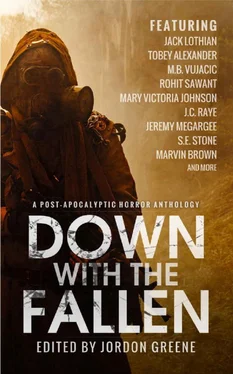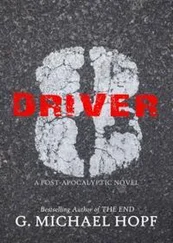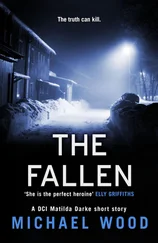“I’m sorry, hon, you know it may not be good,” Haley said. “It’s July, you know. People don’t light fires in July.”
She was barely keeping her eyes open. She was barely standing on her feet. If she were on her own, she would have put an end to it a long time ago. She had a knife. But she wasn’t alone. She had a 12-year-old to take care of and she had promised Jim.
“Can you give me just a minute?” she asked and without waiting for an answer, she slipped the straps of the backpack off her shoulders and sagged to the ground.
“Sure,” Juli said quietly. “I’m sorry.” She sat down next to her mother, crossing her legs. “Are you in pain?”
Haley shook her head and tried to smile. She almost did and saw Juli’s face mirroring her expression. The deep brown eyes, the raven black hair—Jim’s eyes and hair—sent a bolt of pain through her chest but she swallowed it and tried to smile.
“I’ll be fine, just need a bit of a rest before we reach that house.”
“Sure,” Juli said, frowning. “We can wait ’til tomorrow, if you want.”
“No, we can’t,” Haley said, looking around and then meeting her daughter’s eyes. She saw the disgust that suddenly claimed the girl’s face. “It’s okay. I forget about them too sometimes.”
They were surrounded by corpses. The road leading to the village was lined with piles of still decomposing bodies, bony fingers sticking out from rotting sleeves, eyeless skulls with pieces of skin still stubbornly hanging onto them staring at the woman and the girl, the bodies at the bottom crushed by so many other bodies on top, human parts scattered around the piles.
“It must have been bad,” Haley said, gazing at the stinking piles.
At the beginning, she used to throw up from the smell whenever the Barnes family encountered a single corpse, of which there were many. Then the killings began on a mass scale. Now, a year later, Haley didn’t notice the smell most of the time. Neither did Juli. The girl looked embarrassed by it now. Haley got hold of her hand and squeezed. “It doesn’t matter.”
“Yeah, I know,” Juli said, squeezing her mother’s hand back. She cleared her throat and tore her eyes from the piles of former humans. “I just forgot and that’s kind of scary.”
“I know, honey,” Haley said. “I forget about it, too. It’s normal.”
“But it stinks so badly!” Juli said. “It’s… It’s disgusting!”
“I know. I know.” A shot of pain made her wince again and double over.
“Mom?” Panic rang out loud from that single word.
“I’ll be all right,” Haley said. “I will, I promise. Just a cramp.”
She’d been pregnant when Jim died. She was no longer pregnant, exhaustion and malnourishment had taken quick care of that last mistake she and her husband had made, but she was still bleeding. Haley hoped she hadn’t developed an infection, she really hoped. Doctors and medicines were hard to come by these days, as was food.
“Are you sure?” Juli asked, her eyes wide with fear. Haley thought, not for the first time, what she would do to make this fear go away. Anything, that’s what she would do. Or maybe not, she thought hazily. Sometimes there was a worse look in her girl’s eyes—an absent, indifferent look. Haley was seeing it more and more often.
“I am,” she said, hoping she’d managed the reassuring expression she tried for.
“Okay,” the girl said and looked away, to the house with the smoke coming from the chimney. Haley sighed.
They sat like this for another minute or so. Haley offered Juli water from the half-empty and much used plastic bottle she carried in the backpack. Juli refused. Haley took a very small sip and put the bottle back. They had to find water soon. This was their last bottle and the sun was scorching. Haley stood up, slowly and carefully.
“Come on, Juli, let’s go,” she said, picking up the backpack and putting it on. “Got your knife?”
Juli rolled her eyes and that made Haley finally smile. The kid was still okay. As okay as a kid of 12 could be a year after a breakout that had wiped out 80 percent of the population. At least, that’s how it looked to Haley. Their whole neighborhood was gone, dead or sick, very sick. And infectious. So infectious that you couldn’t touch them unless you wanted to become like them—completely retarded, incapable of doing anything more than shuffle aimlessly, mouth hanging open, and moan. Zombies, only not those from the movies, thankfully. The sick ones didn’t chase people and they didn’t try to eat them, but they could still be dangerous because sometimes they lurked in their houses and could grab the unwary by an arm or a leg, which was a death sentence. They died of starvation and dehydration. Or they got shot and thrown by the road. Nobody could be bothered with graves, not any more.
The disease was terminal, whether you died quickly, from complications, or wilted away slowly like these new helpless monsters whose touch was death. Everyone died, some by their own hand right after they were infected or even without being infected. They just couldn’t take it, and Haley could completely relate. She couldn’t take it either but she was taking it. Just like most of the people still left out there, she guessed.
“All right now,” Haley said as they started walking again. “What’s the drill?”
The first time she’d referred to it as a drill, Juli had laughed, a little hysterically but still amused. This was exactly why Haley had used the word. Yet funny or not, they both knew they had to be prepared for their encounters with strangers. So far they’d been lucky. Kind of.
“We move slowly, we look around, and we listen,” Juli recited.
“And?”
“And we’re ready to run if we hear a moan,” her daughter said.
They didn’t carry knives. It was a joke that Jim had come up with a few months ago, after they’d waited out the exodus and the quick deaths, and they were forced to move on because they’d eaten all the food. The shops were looted, the streets were clogged by empty cars, so walking was their only option. Jim had taken a knife, the biggest knife from the kitchen. But they all knew, even Juli, that a knife would be useless if one of the sick ones touched them. The knife was for the healthy ones. They all knew that, too.
The piles of human bodies thinned as they approached the town. By the time the two got to the sign that said “Biderford,” all traces of corpses had disappeared. The stench remained, though. It was everywhere. Juli turned around and looked at the road they’d just come from.
“Do you think they killed them all?”
“Yes,” Haley said curtly. Even though they’d spent a year surviving, running, and hiding, she still had that instinct to protect her daughter from life’s cruelties, which had significantly multiplied over the past twelve months. Yet now she saw no point in trying to make the truth look prettier. Not that it was possible, really, not after they’d both seen the piles of decomposing flesh and cloth.
“Makes sense,” Juli murmured. They’d stopped to look around. There weren’t any obvious signs of life in the town, or at least this part of it—only an empty road lined by seemingly empty houses. There were no cars, which probably meant there were enough survivors in Biderford to have cleared them from the streets. Why anyone would bother doing that was beyond Haley but if the townspeople had really driven the sick ones out and massacred them, then they were probably capable of caring about the state of their streets and clearing them from abandoned cars. Or they just all left in those cars if we’re being realistic , Haley told herself.
The house with the smoke coming out from its chimney was two houses down on the right. An unassuming two-storey affair in faded white. That’s how it looked from a distance, anyway. The smoke continued to trickle up into the still July air, dissipating into the intense blue of the sky. For a second everything looked so peaceful that Haley dared imagine that this whole last year was a nightmare, an extremely vivid one but still just a nightmare. And then the stench returned, filling her nostrils, bringing her back to reality.
Читать дальше












